
Journal of Climate Change
Scope & Guideline
Pioneering insights into climate change impacts and strategies.
Introduction
Aims and Scopes
- Climate Change Impact Assessment:
Research assessing the direct and indirect impacts of climate change on various ecosystems, agriculture, and human livelihoods, often employing quantitative and qualitative methodologies. - Adaptation Strategies:
Studies that explore innovative adaptation strategies for communities and ecosystems facing climate-related challenges, including agricultural practices, urban planning, and disaster management. - Mitigation and Environmental Management:
Research focused on strategies and technologies aimed at reducing greenhouse gas emissions and enhancing carbon sequestration, including renewable energy and sustainable resource management. - Climate Modeling and Forecasting:
Utilization of advanced modeling techniques to predict future climate scenarios and assess their potential impacts on the environment and human systems. - Socio-Economic Dimensions of Climate Change:
Exploration of the socio-economic implications of climate change, including policy analysis, economic resilience, and the intersection of climate change with public health and social equity. - Paleoenvironmental Studies:
Research leveraging geological and paleontological data to understand past climate conditions, which can inform current climate change models and predictions.
Trending and Emerging
- Integration of Technology and Climate Science:
There is a growing trend in the application of advanced technologies, such as cloud computing, IoT, and artificial intelligence, to enhance climate data analytics and environmental monitoring. - Climate Change and Public Health:
Research exploring the links between climate change and public health outcomes is gaining traction, highlighting the need for integrated approaches to address health vulnerabilities exacerbated by climate factors. - Socio-Ecological Resilience:
An increasing focus on understanding and enhancing the resilience of social-ecological systems to climate change, emphasizing adaptive management and community involvement. - Interdisciplinary Approaches to Climate Education:
Research that promotes climate change education and awareness across various sectors, including education systems, is becoming more prominent as the need for informed public discourse grows. - Cultural and Indigenous Perspectives:
Emerging studies that incorporate indigenous knowledge systems and cultural perspectives in climate adaptation and mitigation strategies are gaining recognition, reflecting a shift towards inclusivity in climate discourse.
Declining or Waning
- Traditional Climate Change Mitigation Approaches:
Research focusing solely on conventional mitigation strategies, such as carbon capture and storage, is less prevalent, as the field moves towards integrated approaches that also address social and economic factors. - Static Environmental Assessments:
Studies that provide static assessments of environmental conditions without considering dynamic interactions with climate change impacts are increasingly being overshadowed by more comprehensive, systems-based approaches. - Narrow Regional Focus:
Research that concentrates on localized studies without broader implications or connections to global climate change issues is declining, emphasizing the need for more interdisciplinary and global perspectives.
Similar Journals

One Earth
Pioneering insights for a healthier, more sustainable Earth.One Earth is a premier academic journal published by Cell Press, dedicated to advancing research in the fields of Earth and Planetary Sciences as well as Environmental Science. With an impactful presence in the academic community and an impressive ranking, One Earth has achieved Q1 status in both Earth and Planetary Sciences and Environmental Science, showing its commitment to the highest standards of scholarly excellence. Founded in 2019, this journal has quickly established itself as a leading platform for groundbreaking research, contributing to the global conversation on sustainability and environmental stewardship. With a distinguished Scopus rank placing it in the 99th percentile among Earth and Planetary Sciences and the 97th percentile in General Environmental Science categories, One Earth aims to disseminate cutting-edge findings and foster innovative approaches to address pressing global challenges. The journal is indexed with an ISSN of 2590-3330 and an E-ISSN of 2590-3322, supporting a broad audience of researchers, professionals, and students passionate about ecological integrity and planetary health.
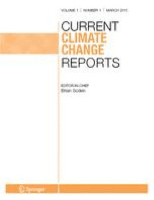
Current Climate Change Reports
Connecting Science to Global Climate ChallengesCurrent Climate Change Reports, published by SPRINGER HEIDELBERG, stands at the forefront of research in the realms of atmospheric science and global change, boasting an impressive Q1 category ranking in both fields as of 2023. With an ISSN of 2198-6061, this esteemed journal has been disseminating crucial findings since its inception in 2015 and continues to be a pivotal platform for scholarly discourse on climate issues. Based in Switzerland, the journal offers a comprehensive examination of climate dynamics, impacts, and sustainability solutions, thereby addressing the pressing challenges associated with climate change. While currently not available as open access, Current Climate Change Reports is indexed in Scopus, where it ranks in the top tiers, notably #2 in Atmospheric Science and #4 in Environmental Science, reflecting its significant influence and contribution to scientific knowledge. Researchers, professionals, and students alike will find this journal an indispensable resource for the latest developments and insights in climate research.
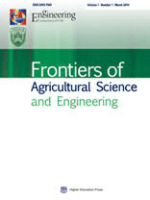
Frontiers of Agricultural Science and Engineering
Fostering global collaboration in agricultural and biological sciences.Frontiers of Agricultural Science and Engineering, published by HIGHER EDUCATION PRESS, is a distinguished open-access journal established in 2014, dedicated to advancing research across the fields of agricultural and biological sciences, biotechnology, and veterinary studies. With an impressive Q1 ranking in both Agricultural and Biological Sciences and Veterinary categories for 2023, this journal positions itself prominently within the academic landscape, reflecting the importance and quality of the research it disseminates. The journal serves as a vital platform for researchers, professionals, and students worldwide, featuring a broad array of studies that enhance our understanding of agricultural technologies, biotechnological innovations, and veterinary sciences. With a focus on rigor and accessibility, Frontiers of Agricultural Science and Engineering promotes the global exchange of knowledge, encouraging the collaboration that is essential for tackling contemporary challenges in these critical fields. Available online with a comprehensive range of article options, it continues to contribute to the scientific community's advancements in agricultural and biological disciplines.
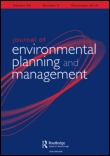
Journal of Environmental Planning and Management
Exploring the intersection of policy and environmental science.The Journal of Environmental Planning and Management, published by Routledge Journals, Taylor & Francis Ltd, is a leading academic journal dedicated to advancing the field of environmental science through innovative research and critical analysis. With a robust impact factor and categorized in Q1 across multiple disciplines, including Environmental Science, Geography, and Fluid Flow, this journal holds a prestigious position in the academic community. It serves as a vital platform for researchers, professionals, and students interested in the complexities of environmental management, policy, and planning, promoting insightful discourse on sustainable practices and innovative solutions. Although the journal does not currently offer Open Access options, it remains widely accessible through institutional subscriptions, ensuring that pertinent research reaches a broad audience. Since its inception in 1992, the journal has shown a commitment to excellence, making significant contributions to our understanding of environmental issues and the interplay between human activity and natural systems. The Journal of Environmental Planning and Management invites submissions that not only push the boundaries of existing knowledge but also foster interdisciplinary collaboration in the quest for sustainable development.

Regional Environmental Change
Exploring the Dynamics of Environmental TransformationRegional Environmental Change, published by SPRINGER HEIDELBERG, is a leading journal dedicated to the critical field of Environmental Science, specifically focusing on the global and planetary changes affecting our regional environments. Since its inception in 2005 and continuing through 2024, the journal has been a pivotal platform for disseminating cutting-edge research, insights, and methodologies that address pressing environmental issues. With an impressive Scopus rank, placing it in the top 30% of journals in its category, Regional Environmental Change (ISSN: 1436-3798; E-ISSN: 1436-378X) showcases high-quality academic articles that engage with the multifaceted impacts of environmental shifts, providing researchers, professionals, and students with vital knowledge and data. Although the journal does not currently offer Open Access, it remains a crucial resource for those committed to understanding and mitigating the effects of environmental change on regional ecosystems and communities.

Mitigation and Adaptation Strategies for Global Change
Connecting Knowledge to Action for a Resilient PlanetMitigation and Adaptation Strategies for Global Change is a prestigious journal published by SPRINGER, focusing on the critical areas of ecology and global change. With an impressive impact factor that places it in the Q1 and Q2 quartiles in their respective categories, this journal serves as an essential platform for researchers, professionals, and students actively engaged in addressing the challenges posed by climate and environmental changes. Since its inception in 1996, the journal has evolved to cover a wide range of interdisciplinary topics, fostering a holistic understanding of mitigation strategies and adaptation practices worldwide. Located in the Netherlands, it benefits from a robust editorial board and significant contributions from leading experts in the field. Although it does not currently offer Open Access, the journal's rigorous peer-review process ensures that only high-quality research is disseminated, making it a valuable resource for anyone seeking to remain at the forefront of global change research.
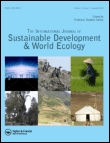
INTERNATIONAL JOURNAL OF SUSTAINABLE DEVELOPMENT AND WORLD ECOLOGY
Connecting scholars for a greener tomorrow.The INTERNATIONAL JOURNAL OF SUSTAINABLE DEVELOPMENT AND WORLD ECOLOGY, published by TAYLOR & FRANCIS INC, stands as a pivotal resource for scholars and practitioners focused on sustainable development and environmental ethics. With an ISSN of 1350-4509 and an E-ISSN of 1745-2627, this journal has made significant strides in the academic landscape since its inception in 1994, aiming to address the complex interrelations between ecological sustainability and development policies on a global scale. Renowned for its rigorous peer-review process, it has achieved a prestigious Q1 classification in both Geography, Planning and Development and Management, Monitoring, Policy and Law, highlighting its influence and relevance among the top tier of scholarly publications. As evidenced by its impressive rankings in Scopus—32nd in Geography and 34th in Environmental Science—this journal plays a critical role in shaping contemporary discourses on sustainable practices. Although it does not currently offer Open Access options, the journal is dedicated to providing a platform for innovative research that not only informs policy-making but also fosters a deeper understanding of global environmental challenges. Whether you are a researcher, policymaker, or student, engaging with the latest findings published in this journal will enhance your insight into sustainable development paradigms.
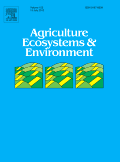
AGRICULTURE ECOSYSTEMS & ENVIRONMENT
Innovating Research for a Greener TomorrowAGRICULTURE ECOSYSTEMS & ENVIRONMENT is a premier journal published by Elsevier, specializing in the fields of agronomy, animal science, and ecology. With an impressive impact factor reflective of its stature, it ranks in the top quartile (Q1) across three significant categories, highlighting its critical role in advancing research within the agricultural and environmental sciences. The journal serves as a vital platform for disseminating high-quality research that addresses the complex interactions between agriculture and ecosystems, providing insightful methodologies and findings that inform sustainable practices. As the journal continues to converge from 1983 and through to 2025, it remains committed to offering both traditional and innovative access options while contributing to the academic community's understanding of pressing environmental challenges. Researchers, professionals, and students are encouraged to engage with the journal's comprehensive content, which is positioned among the elite in its fields, having achieved top rankings in Scopus across relevant disciplines.
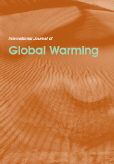
International Journal of Global Warming
Shaping Environmental Policy through Scholarly InsightWelcome to the International Journal of Global Warming, a pioneering publication dedicated to advancing knowledge in the crucial fields of global warming, climate change, and environmental policy. Published by INDERSCIENCE ENTERPRISES LTD, this journal serves as an essential platform for interdisciplinary research, examining the multifaceted impacts of global temperature rises on our planet. Since its inception in 2009 and continuing through to 2024, the journal has fostered a vibrant scholarly community, despite currently being indexed in the Q4 quartile for Atmospheric Science and Global and Planetary Change. The journal's unique focus allows researchers, professionals, and students to engage with critical data and innovative methodologies in environmental management, monitoring, and legal policy responses. Submissions are invited from scholars worldwide, though the journal is not open access, ensuring a selective and quality-driven publication process. Beyond its academic contributions, the International Journal of Global Warming plays a significant role in shaping discussions about climate resilience and sustainability practices, making it a vital resource in today's pressing environmental discourse.
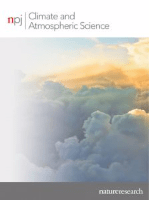
npj Climate and Atmospheric Science
Connecting research to real-world climate solutions.npj Climate and Atmospheric Science, published by NATURE PORTFOLIO, is a premier Open Access journal dedicated to advancing the understanding of climatic and atmospheric phenomena. Since its inception in 2018, this journal has positioned itself as a leader in its field, achieving Q1 ranking in 2023 across key categories such as Atmospheric Science, Environmental Chemistry, and Global and Planetary Change. With a Scopus rank of #23 out of 148 in Earth and Planetary Sciences and a commendable percentile ranking, npj Climate and Atmospheric Science serves as an essential platform for disseminating high-quality research, fostering interdisciplinary collaboration, and addressing critical global challenges. Its open access policy ensures that vital research findings are available to a broad audience, facilitating scholarly engagement and innovation. Researchers, professionals, and students in the fields of environmental science and climate studies will find this journal a valuable resource for cutting-edge studies and transformative insights.